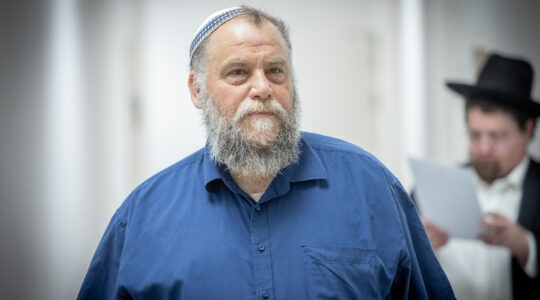JERUSALEM (JTA) — Here are some recent stories from Israel that you may have missed.
Dancing with Pamela
Former "Baywatch" star Pamela Anderson is preparing to dance into Israelis’ hearts.
Coming off her sixth-place finish on America’s "Dancing with the Stars," the 43-year-old Anderson will appear as a guest judge in the sixth season of Israel’s "Dancing" version. In addition to voting and offering the Israeli dancers feedback, the former model and Playboy cover girl reportedly will do some dancing, too.
Anderson’s comments will be subtitled in Hebrew.
Don’t mess with the monkeys
A new security barrier going up in Jerusalem will protect Israeli families from a new kind of intifada: rock-throwing chimpanzees.
The chimps at Jerusalem’s Biblical Zoo begin throwing rocks whenever they became agitated, The Jerusalem Post reported. And their rock-throwing antics usually generate large crowds, agitating them even more.
The new reinforced glass barrier, which is not called a security fence, coupled with filling in the moat in the chimpanzee exhibit, will allow the chimps to come right to the glass and get a close-up view of their human audience.
Freezing eggs for future fertility
Healthy Israeli women in their 30s can now freeze their eggs for future use.
Under the Health Ministry’s national health care package, the women will be allowed to freeze 20 ova harvested in up to four extractions.
Until now, only women undergoing current fertility treatments or potentially egg-destroying treatment such as chemotherapy were covered for egg freezing under the national health care plan.
The new law, which went into effect at the beginning of the month, will also allow Israeli women to serve as egg donors, meaning that Israelis will not have to look to women abroad for egg donations.
Gabi the elephant does Turkey
A famous Israeli elephant has taken up residence in Turkey. But it’s not a signal of thawing of relations between the two countries.
Gabi the elephant, who was born in Jerusalem’s Biblical Zoo in 2005 after being conceived by artificial insemination, boarded a ship bound for Turkey last week with two other elephants, zebras, a hippo and several lemurs from the zoo and the Ramat Gan Safari.
The animals docked in Turkey before traveling overland to a zoo in Gaziantep, not far from the Syrian border.
The current tensions between Turkey and Israel, which were raised after Israeli commandos killed nine Turkish activists while intercepting a Turkish-flagged ship attempting to evade Israel’s naval blockade of Gaza, were not a factor in the transfer, according to Shmulik Yedvad, the zoo’s head curator. He said the transfer was handled zoo to zoo, not government to government.
“There’s no connection to politics," Yedvad, who raised Gabi from birth, told the Jerusalem Post.
He added that "Happily, everyone is working together for the good of the animals, and all the politics are just not relevant.”
High prices for iPhone4
Whoever said talk is cheap never tried to purchase the latest smartphone in Israel. Israelis pay the world’s highest prices for the new iPhone 4, according to several surveys.
An unlocked 16 gigabyte iPhone 4 purchased in Israel will cost nearly $1,100, compared to prices in the $700 range in Britain and Canada, according to the Israeli business daily The Marker.
The discrepancy in price comes from several factors, The Media Line reported, including Israel’s hefty 17 percent Value Added Tax and the fact that one company, iDigital, has a monopoly on the distribution of Apple products in Israel.
The high prices send many Israelis to eBay to buy their devices, or to buy when they are abroad.
Biding their time for Bieber
Young Israeli music fans are keeping their summer music calendars open after hearing that teen pop star Justin Bieber will perform in Israel.
Seven Israeli producers are vying for the opportunity to bring the 16-year-old heartthrob to center stage in Israel next summer or perhaps in April, Yediot Achronot reported last week. The performance in Israel would be part of Bieber’s "My World Tour" that began in June following the launch of his second album, "My World 2.0."
Bieber recently accepted an offer to perform in Israel at a private event held by a French millionaire, according to Yediot. The cost to stage a Bieber concert in Israel is estimated at $1.5 million, the newspaper reported.
Meanwhile, a Facebook page called "Justin Bieber fans in Israel" had 11,224 fans as of Sunday.
‘Traffic Light’ gets Emmy go-ahead
An Israeli sitcom about three longtime friends and their romantic relationships was nominated for an international Emmy award.
"Ramzor," which means "traffic light" in Hebrew, was selected as a finalist by a panel of 700 judges from 50 countries.
Earlier this year, the Fox television network bought the rights to the show, which is being called "Mixed Signals" and will begin filming next month. The American version will be written by Bob Fischer, who wrote the Fox TV series "Married with Children" and the film "Wedding Crashers."
"Ramzor," which airs on Israel Channel 2 and is owned by its franchisee, Keshet, is taping its third season. Its second season was among the top 10 most watched shows of 2009, with 23.7 percent of Israelis watching.
Its competitors for the Emmy include shows from Thailand, Mexico and Britain. The winner will be announced during the Nov. 22 Emmy Awards in New York.
Costly morning rush hour
Traffic jams in Israel are not just irritating, they are expensive. A new report issued by Israel’s Finance Ministry says that the Israeli economy loses more than $5.5 billion annually as a result of traffic jams.
The traffic jams may be a result of the fact that the use of public transportation by commuters going to and from work dropped by 20 percent between 1995 and 2008, along with a reported increase of the use of private cars of 15 percent, Haaretz reported. A 2007 United Nations study found that Israel had the most crowded roads of all the Western countries it studied.
The number of cars entering Tel Aviv daily rose by 18 percent between 2004 and 2008, and by 16 percent in Jerusalem. A rise of 46 percent of traffic in Jerusalem between 2015 and 2030 is possible, according to the Transportation Ministry.
Meanwhile, Tel Aviv said it will ban trucks from entering the city on major roads during the 6 a.m. to 9 a.m. rush hour beginning Jan 1. The plan is similar to one in effect in Jerusalem.





